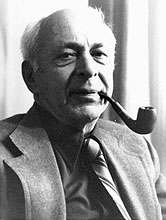| Magazine Home I Links I Contact Us |
|
Home |
What Is Locus of Control?
Locus of control in social psychology refers to the extent to which individuals believe that they can control events that affect them. Understanding of the concept was developed by Julian B. Rotter in 1954, and has since become an important aspect of personality studies. Individuals with a high internal locus of control believe that events result primarily from their own behavior and actions. Those with a low internal locus of control believe that powerful others, fate, or chance primarily determine events. Those with a high internal locus of control have better control of their behavior, tend to exhibit more political behaviors, and are more likely to attempt to influence other people than those with a low external locus of control. Those with a high internal locus of control are more likely to assume that their efforts will be successful. They are more active in seeking information and knowledge concerning their situation. One's "locus" (Latin for "place" or "location") can either be internal (meaning the person believes that they control their life) or external (meaning they believe that their environment, some higher power, or other people control their decisions and their life). |
| Home A B C D E F G H I J K L M N O P Q R S T U V W X Y Z |